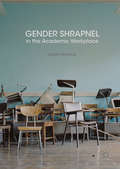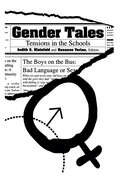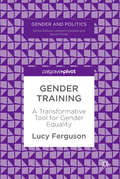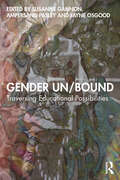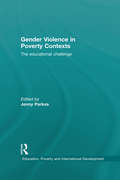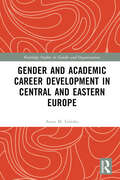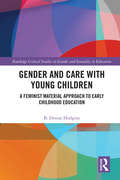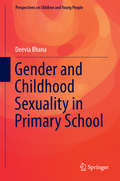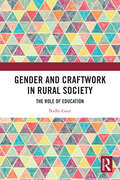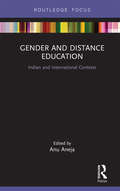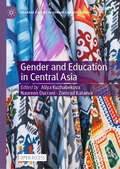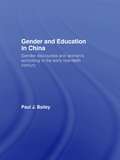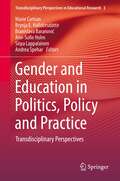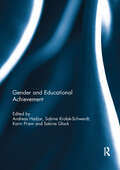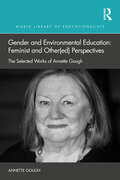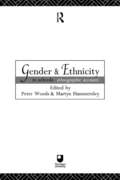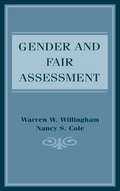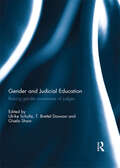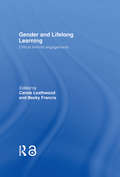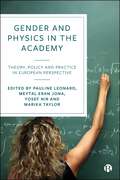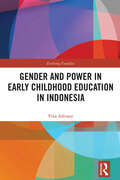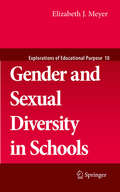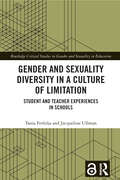- Table View
- List View
Gender Shrapnel in the Academic Workplace
by Ellen MayockThis book employs the image of "shrapnel," bits of scattered metal that can hit purposeful targets or unwitting bystanders, to narrate the story of workplace power and gender discrimination. The project interweaves stories of gender shrapnel with an examination of national rhetoric surrounding business, education, and law to uncover underlying phenomena that contribute to discourse on privilege and gender in the academic workplace. Using concrete examples that serve as case studies for subsequent discussion of data about women in the workforce, language use and misuse, sexual harassment, silence and shutting up, and hiring, training, promotion, and the glass ceiling, Mayock explores the deeper implications of gender inequity in the workplace.
Gender Tales: Tensions in the Schools
by Judith S. Kleinfeld Suzanne YerianA book of "real world" cases, this text introduces "flashpoint" issues related to gender equity in the schools. It immerses readers in the human dilemmas teachers face when they set out to provide equal opportunities for -- and to develop the abilities of -- all of their students. Each case, a true but disguised situation, presents the pedagogical concerns, ethical questions, competing values, and complexity of social change teachers face on a daily basis in their classrooms. These cases help readers to identify and understand ideas and issues by relating them to both their own and others' real-life experiences. The book includes activities and discussion questions to involve readers in critical thinking about the issues raised in the cases and in applying this knowledge to their own current or future classroom practice. Using a casebook approach, the text is organized in five sections. Designed to help readers explore the issues raised by contextualizing them in stories that are authentic and engaging, it emphasizes the teacher's role as a skilled professional who thinks critically and makes decisions, and creates lively and involved class discussion by making room for students with diverse perspectives.
Gender Training: A Transformative Tool for Gender Equality (Gender and Politics)
by Lucy FergusonThis book develops a case for feminist gender training as a catalyst for disjuncture, rupture and change. Chapter 1 traces the historical development and current contours of the field of gender training. In Chapter 2, the key critiques of gender training are substantively engaged with from the perspective of reflexive practice, highlighting the need to work strategically within existing constraints. Questions of transformative change are addressed in Chapter 3, which reviews feminist approaches to change and how these can be applied to enhance the impact of gender training. Chapter 4 considers the theory and practice of feminist pedagogies in gender training. In the final chapter, new avenues for gender training are explored: working with privilege; engaging with applied theatre; and mindfulness/meditation. The study takes gender training beyond its often technocratic form towards a creative, liberating process with the potential to evoke tangible, lasting transformation for gender equality.
Gender Un/Bound: Traversing Educational Possibilities
by Jayne Osgood Susanne Gannon Ampersand PasleyThis collection is focused on the possibilities for unbinding people from gendered expectations in and around educational spaces, and accounts for the ways gender is reconstituted in and through education.This book presents a broad interpretation of gender, of what education might mean, and where educational experiences manifest. It explores more conventional schooling spaces to communally generated inclusive spaces, families and marginalised sites where gender is realised and contested. Alongside more familiar framings, the book incorporates decolonial and Indigenous contestations, theoretical innovations and methodological experiments that pry open the ways that gender binds and limits individuals. The chapters are organised in smaller conceptual clusters, offering multiple and overlapping reading paths according to the interests of the reader. A mapping of clusters and potential reading paths is included at the opening of the book, designed for instructors to expand course content.Written to enrich reading for preservice teacher education students and to challenge researchers, postgraduate and doctoral candidates, this book provides essential new perspectives on gender, education and the various ways in which they are un/bound together and apart.
Gender Violence in Poverty Contexts: The educational challenge (Education, Poverty and International Development)
by Jenny ParkesThis book is concerned with understanding the complex ways in which gender violence and poverty impact on young people’s lives, and the potential for education to challenge violence. Although there has been a recent expansion of research on gender violence and schooling, the field of research that brings together thinking on gender violence, poverty and education is in its infancy. This book sets out to establish this new field by offering innovative research insights into the nature of violence affecting children and young people; the sources of violence, including the relationship with poverty and inequality; the effects of violence on young subjectivities; and the educational challenge of how to counter violence. Authors address three interrelated aims in their chapters: to identify theoretical and methodological framings for understanding the relationship between gender, violence, poverty and education to demonstrate how young people living in varying contexts of poverty in the Global South learn about, engage in, respond to and resist gender violence to investigate how institutions, including schools, families, communities, governments, international and non-governmental organisations and the media constrain or expand possibilities to challenge gender violence in the Global South. Describing a range of innovative research projects, the chapters display what scholarly work can offer to help meet the educational challenge, and to find ways to help young people and those around them to understand, resist and rupture the many faces of violence. Gender Violence in Poverty Contexts will appeal to an international audience of postgraduate students, academics and researchers in the fields of international and comparative education, gender and women’s studies, teacher education, poverty, development and conflict studies, African and Asian studies and related disciplines. It will also be of interest to professionals in NGOs and other organisations, and policy makers, keen to develop research-informed practice. Winner of the 2016 Jackie Kirk Outstanding Book Award.
Gender Violence, Art, and the Viewer: An Intervention
by Ellen C. Caldwell, Cynthia S. Colburn, and Ella J. GonzalezThe works covered in college art history classes frequently depict violence against women. Traditional survey textbooks highlight the impressive formal qualities of artworks depicting rape, murder, and other violence but often fail to address the violent content and context. Gender Violence, Art, and the Viewer investigates the role that the art history field has played in the past and can play in the future in education around gender violence in the arts. It asks art historians, museum educators, curators, and students to consider how, in the time of #MeToo, a public reckoning with gender violence in art can revitalize the field of art history.Contributors to this timely volume amplify the voices and experiences of victims and survivors depicted throughout history, critically engage with sexually violent images, open meaningful and empowering discussions about visual assaults against women, reevaluate how we have viewed and narrated such works, and assess how we approach and teach famed works created by artists implicated in gender-based violence. Gender Violence, Art, and the Viewer includes contributions by the editors as well as Veronica Alvarez, Indira Bailey, Melia Belli Bose, Charlene Villaseñor Black, Ria Brodell, Megan Cifarelli, Monika Fabijanska, Vivien Green Fryd, Carmen Hermo, Bryan C. Keene, Natalie Madrigal, Lisa Rafanelli, Nicole Scalissi, Hallie Rose Scott, Theresa Sotto, and Angela Two Stars. It is sure to be of keen interest to art history scholars and students and anyone working at the intersections of art and social justice.
Gender and Academic Career Development in Central and Eastern Europe (Routledge Studies in Gender and Organizations)
by Anna M. GórskaThe nature of academic institutions is inherently gendered. This is because higher education institutions (HEIs) do not operate in a void but, rather, are part and parcel of patriarchal social structures. This book offers a comprehensive presentation of the gendered and gendering academic career development. It explores various scholarly roles that academics face throughout their careers and how they are gendered in their nature. The book connects relevant literature on the topic with novel empirical studies to increase the understanding how gender is played in academia across different roles and different career stages. The empirical context is conducted in Central and Eastern Europe that sheds new light on the gendered and gendering nature in academia in the region. The book also offers propositions on how to undo gender academia to make it a more inclusive workplace for all. Dedicated for an academic reader employed in higher education institutions, particularly among those who are involved in the management of such institutions this volume will be of great interest to researchers, academics, and advanced students in the fields of human resource management, organizational studies, higher education, and gender studies.
Gender and Care with Young Children: A Feminist Material Approach to Early Childhood Education (Routledge Critical Studies in Gender and Sexuality in Education)
by B. Denise HodginsThis book is an exploration of how children, educators, and things become implicated in gendered caring practices. Drawing on a collaborative research study with early childhood educators and young children, the author examines what an engagement with human-and non-human relationality does to complicate conversations about gender and care. By employing a feminist material analysis of early childhood education, this book rethinks dominant Euro-Western individualist pedagogies in order to reposition them within a relationality framework. The analysis illuminates the political and ethical embeddedness of early childhood education and the understanding that gendering and caring emerge with/in a complex web of many relations.
Gender and Childhood Sexuality in Primary School
by Deevia BhanaThis book is an ethnography of teachers and children in grades 1 and 2, and presents arguments about why we should take gender and childhood sexuality seriously in the early years of South African primary schooling. Taking issue with dominant discourses which assumes children's lack of agency, the book questions the epistemological foundations of childhood discourses that produce innocence. It examines the paradox between teachers' dominant narratives of childhood innocence and children's own conceptualisation of gender and sexuality inside the classroom, with peers, in heterosexual games, in the playground and through boyfriend-girlfriend relationships. It examines the nuances and finely situated experiences which draw attention to hegemonic masculinity and femininity where boys and girls challenge and contest relations of power. The book focuses on the early makings of gender and sexual harassment and shows how violent gender relations are manifest even amongst very young boys and girls. Attention is given to the interconnections with race, class, structural inequalities, as well as the actions of boys and girls as navigate gender and sexuality at school. The book argues that the early years of primary schooling are a key site for the production and reproduction of gender and sexuality. Gender reform strategies are vital in this sector of schooling.
Gender and Craftwork in Rural Society: The Role of Education
by Nidhi GaurThis book examines the potential of craft-centred education to influence the gender socialisation of rural children through a philosophical, sociological, and psychological lens. It discusses Gandhi’s vision of craft-centred education and situates its place within his concept of ‘swaraj.’ The volume looks at the construction of gender at home, students’ participation in crafts at school, and parental perception of craft-centred education. It studies the students’ experience, its impact on their intellectual and physical development, and the nature of the interaction between the socialisation of children at home and in school.An important contribution to the study of Gandhian practices, the book will be of considerable interest to students and researchers of gender studies, education, non-violence, peace studies, and South Asian studies.
Gender and Distance Education: Indian and International Contexts
by Anu AnejaThis book investigates the intersection of gender and distance education from a feminist perspective and explores their contemporary innovative interfaces in Indian and international contexts. The key issues raised here include a re- investigation of the democratizing potential of distance education from a gendered perspective (especially in developing countries such as India), feminist pedagogical perspectives on the notion of transactional distance, the relationship between masculinity and gerontology from the perspective of non- traditional modes, and the interrelationships between gender and social media from a distance education perspective. As opposed to the conventional, physical classroom, the virtual classroom often occupies a de- privileged space in feminist pedagogical discussions, since it appears to align itself less easily with feminist praxes which encourage a free, intellectual exchange between teachers and students. By opening up various facets of the relationship between gender, distance education and feminist pedagogy, the book foregrounds the critical need to re- visit preconceived, unfavourable assumptions about this relationship and proposes mutually productive inter-linkages. It does so in the context of contemporary circumstances defined by the increasing use of virtual technology, the ongoing need for democratization of higher education and the constraints posed by consumerist trends. Lucid and topical, this Focus volume will be useful to scholars and researchers of higher education, open and distance education, feminist pedagogy, gender studies, feminism, masculinity, and women’s studies as well as practitioners and policymakers working in the education sector.
Gender and Education in Central Asia (Palgrave Studies in Gender and Education)
by Naureen Durrani Aliya Kuzhabekova Zumrad KataevaThis open access book brings together established and emerging scholars to explore policies, statistical trends and representative research on gender equity across post-Soviet Central Asia. The book provides an overview of policy development in the promotion of gender equity, a comparative summary of changes in gender equity indicators at various levels of education, and examples of current research on an array of issues relating to gender equity across the region. The chapters present a broad picture which will be relevant to scholars of educational reform, comparative education policy, international development and gender issues.
Gender and Education in China: Gender Discourses and Women's Schooling in the Early Twentieth Century (Routledge Contemporary China Series #Vol. 15)
by Paul J. BaileyGender and Education in China analyzes the significance, impact and nature of women's public education in China from its beginnings at the turn of the twentieth century. Educational change was an integral aspect of the early twentieth century state-building and modernizing reforms implemented by the Qing dynasty as a means of strengthening the foundations of dynastic rule and reinvigorating China's economy and society to ward off the threat of foreign imperialism. A significant feature of educational change during this period was the emergence of official and non-official schools for girls. Using primary evidence such as official documents, newspapers and journals, Paul Bailey analyzes the different rationales for women's education provided by officials, educators and reformers, and charts the course and practice of women's education describing how young women responded to the educational opportunities made available to them. Demonstrating how the representation of women and assumptions concerning their role in the household, society and polity underpinned subsequent gender discourses throughout the rest of the century, Gender and Education in China will appeal to students and scholars of Chinese history, gender studies, women's studies as well as an interest in the history of education.
Gender and Education in Politics, Policy and Practice: Transdisciplinary Perspectives (Transdisciplinary Perspectives in Educational Research #3)
by Andrea Spehar Marie Carlson Brynja E. Halldórsdóttir Branislava Baranović Ann-Sofie Holm Sirpa LappalainenThis book presents ideas on education, gender and intersectionality through a transdisciplinary frame by crossing disciplinary and methodological borders. Exploring the diversity of educational settings ranging from early childhood to adult education, it brings together scholars from various disciplines to discuss, deconstruct and problematize gender and education in relation to several themes in a comparative, intersectional, local, national, regional and international perspective. Each chapter approaches the topic in an intersectional and/or transnational manner and creates powerful gendered educational knowledge. Questions addressed in the book include: What are the challenges or barriers to gender-equal education? How can we understand the gaps between formal policies and educational practices? The chapters in the book illustrate how gender and education are relevant and needed concepts within the field of transdisciplinary research. The authors hail from a range of countries, such as Croatia, Indonesia, Turkey, UK, as well as the Nordic region, and they critically examine gender and education at all levels and in diverse sectors, and with varied lenses, such as neoliberalism in education, and the inclusion of newcomers and refugees. The work also critically investigates programs and pedagogical approaches, culture and values, knowledge and identity in teacher education. The book further addresses criticisms of Western and Anglophone bias around “white feminism” and the norm of white, male and heterosexual privilege.
Gender and Educational Achievement
by Andreas Hadjar, Sabine Krolak-Schwerdt, Karin Priem and Sabine GlockGender inequalities in education – in terms of systematic variations in access to educational institutions, in competencies, school marks, and educational certificates along the axis of gender – have tremendously changed over the course of the 20th century. Although this does not apply to all stages and areas of the educational career, it is particularly obvious looking at upper secondary education. Before the major boost of educational expansion in the 1960s, women’s participation in upper secondary general education, and their chances to successfully finish this educational pathway, have been lower than men’s. However, towards the end of the 20th century, women were outperforming men in many European countries and beyond. The international contributions to this book attempt to shed light on the mechanisms behind gender inequalities and the changes made to reduce this inequality. Topics explored by the contributors include gender in science education in the UK; women’s education in Luxembourg in the 19th and 20th century; the ‘gender gap’ debates and their rhetoric in the UK and Finland; sociological perspectives on the gender-equality discourse in Finland; changing gender differences in West Germany in the 20th century; the interplay of subjective well-being and educational attainment in Switzerland; and a psychological perspective on gender identities, gender-related perceptions, students’ motivation, intelligence, personality, and the interaction between student and teacher gender. This book was originally published as a special issue of Educational Research.
Gender and Environmental Education: The Selected Works of Annette Gough (World Library of Educationalists)
by Annette GoughThis timely book provides a starting point for critical analysis and discourse about the status of gendered perspectives in environmental education research.Through bringing together selected writings of Annette Gough, it documents the evolving discussions of gender in environmental education research since the mid-1990s, from its origins in putting women on the agenda through to women’s relationships with nature and ecofeminism, as well as writings that engage with queer theory, intersectionality, assemblages, new materialisms, posthumanism and the more-than-human. The book is both a collection of Annette Gough, and her collaborators, writings around these themes and her reflections on the transitions that have occurred in the field of environmental education related to gender since the late 1980s, as well as her deliberations on future directions.An important new addition to the World Library of Educationalists, this book foregrounds women, their environmental perspectives, and feminist and other gendered research, which have been marginalised for too long in environmental education.
Gender and Ethnicity in Schools: Ethnographic Accounts (Open University Reader - Course E812 Ser.)
by Martyn Hammersley Peter WoodsA serious but highly accessible look at recent work on the issues of gender and race. Gender and Ethnicity in Schools raises crucial educational and political issues, paying particular attention to the pupils' experience of school.
Gender and Fair Assessment
by Warren W. Willingham Nancy S. ColeThere have been many important changes in the participation of women and men in American society over the past quarter-century. Tests play a role in those changes by providing evidence of the diverse achievement and proficiency of women and men. They aid the learning process and reflect inequalities in opportunity to learn and participate. In addition, they provide useful information in considering what alternatives in education and work make most sense for individuals and influence views about groups of students, educational programs, and a wide range of issues. For all of these reasons, it is important that tests assess fairly and reflect accurately the ways young people are and are not achieving as well as desired. The test performance of women and men is a research topic of historical interest and has received much attention in recent years. Because of this increased interest, there is a great deal of new research and data available. The purpose of the study presented in this volume was to review this new information with two objectives in mind: *to clarify patterns of gender difference and similarity in test performance and related achievements, and *to see what implications those findings might have for fair assessment and, as a corollary, examine the assessment process as a possible source of gender differences. This study is interested in tests used in education to assess developed knowledge and skill. In order to gain a broader view of gender similarity and difference, the contributors looked at other types of measures and other characteristics of young women and men. Their hope is to contribute to a firmer basis for insuring fairness in tests--an objective which is particularly important as the field moves increasingly to new forms of assessment in which there is less experience.
Gender and Judicial Education: Raising Gender Awareness of Judges
by Ulrike Schultz, T. Brettel Dawson and Gisela ShawJudicial Education has greatly expanded in common law countries in the past 25 years. More recently it has become a core component in judicial reform programs in developing countries with gender attentiveness as an element required by donor agencies. In civil law jurisdictions judges´ schools have long played a role in the formation of the career judiciary with a focus on entry to the judicial profession, in some countries judges get an intensive in-service education at judicial academies. Gender questions, however, tend to be neglected in the curricula.These judicial education activities have generated a significant body of material and experience which it is timely to review and disseminate. Questions such as the following require answers. What is the current state of affairs? How is judicial education implemented in developed and developing countries all around the world? Who are the educators? Who is being educated? How is judicial education on gender regarded by judges? How effective are these programs?The chapters in this book deal with these questions. They provide a multiplicity of perspectives. Six countries are represented, of these four are civil law countries (Germany, Argentina, Japan, Bosnia and Herzegovina) and two are common law countries (Canada; Uganda). This book was previously published as a special issue of International Journal of the Legal Profession.
Gender and Lifelong Learning: Critical Feminist Engagements
by Becky Francis Carole LeathwoodThis insightful book is ideal for students, researchers and policy makers wanting a sound overview of the critical issues of gender in lifelong learning. Asking pertinent questions relating to discourses on policy, the authors offer the reader a rare view of lifelong learning from a gender-focused perspective, filling a gap in the literature and moving current debate on into new areas. Questions addressed include: To what extent can the policy discourses and institutional contexts of lifelong learning be seen as masculinised and/or feminised? What are the gender implications of lifelong learning policy? In what ways are learners’ identities constructed through lifelong learning? Does lifelong learning provide opportunities to challenge or transgress gender binaries? What are the implications for practice?
Gender and Physical Education: Contemporary Issues and Future Directions
by Dawn PenneyGender and Physical Education offers a critical and comprehensive commentary on issues relating to gender in PE and teacher education. The book challenges our understandings of gender, equity and identity in PE, establishing a conceptual and historical foundation for the issue, as well as presenting a wealth of original research material. The book delivers a critical analysis of the progress and shortcomings pf contemporary policies and practice in PE as they relate to gender, and reflects on the similarities and differences between developments in the UK, US and Australia. It also offers a new framework for research, policy and practice with a view to advancing gender equity, and addresses the roles that teachers, educators and policy makers can play in challenging existing inequalities. Gender and Physical Education is important reading for students and lecturers in education, teacher educators and providers of continuing professional development in PE, and anybody concerned with gender issues in education, PE or sport.
Gender and Physics in the Academy: Theory, Policy and Practice in European Perspective
by Pauline Leonard, Meytal Eran Jona, Yosef Nir, and Marika TaylorThis innovative interdisciplinary collection confronts the worldwide challenge of women's under-representation in science through an interrogation of the field of physics and its gender imbalance. Leading physicists and sociologists from across Europe collaborate to adopt a comparative approach. They draw on theoretical perspectives and empirical evidence to explore the reasons behind low participation levels, from entering the field to sustaining a career, emphasising the importance of social perspectives over biological explanations. Evaluating policy solutions implemented in various European contexts, this book offers key insights into the world of women physicists and sheds light on their life stories.
Gender and Power in Early Childhood Education in Indonesia (Evolving Families)
by Vina AdrianyAdriany explores gender discourses in early childhood education in Indonesia, as well as how teachers and children are engaged in the process of constructing, negotiating, and resisting dominant gender discourses in kindergartens.Using an ethnographic approach, Adriany explores how both the teachers and children are doing and undoing their gender. She adopts feminist poststructuralist and postcolonial theories through her research and, in that context, views gender as something fluid and unfixed. The book also investigates the methodological aspect where the authors have both an inside and outside perspective. Each chapter aims to present and complicate the taken-for-granted practices in kindergartens that relate to how gender and power are constructed. The findings of this book show the extent to which early childhood education becomes a space for the teachers and children to construct, negotiate, as well as resist dominant gender discourses in kindergartens.Offering insights into local and global contexts that shape gender values in early years, this book will be a valuable reference for researchers, scholars, and students in early childhood education, gender studies, and comparative education.
Gender and Sexual Diversity in Schools
by Elizabeth J. MeyerIssues related to gender and sexual diversity in schools can generate a lot of controversy, with many educators and youth advocates under-prepared to address these topics in their school communities. This text offers an easy-to-read introduction to the subject, providing readers with definitions and research evidence, as well as the historical context for understanding the roots of bias in schools related to sex, gender, and sexuality. Additionally, the book offers tangible resources and advice on how to create more equitable learning environments. Topics such as working with same-sex parented families in elementary schools; integrating gender and sexual diversity topics into the curriculum; addressing homophobic bullying and sexual harassment; advising gay-straight alliances; and supporting a transgender or gender non-conforming student are addressed. The suggestions offered by this book are based on recent research evidence and legal decisions to help educators handle the various situations professionally and from an ethical and legally defensible perspective.
Gender and Sexuality Diversity in a Culture of Limitation: Student and Teacher Experiences in Schools (Routledge Critical Studies in Gender and Sexuality in Education)
by Jacqueline Ullman Tania FerfoljaGender and Sexuality Diversity in a Culture of Limitation provides an outstanding and insightful critique of the ways that contemporary education is impacted by a range of political, social and cultural influences that inform the approaches that schools take in relation to gender and sexuality diversity. By applying feminist poststructural and Foucauldian frameworks, the book examines the ongoing impact of broader socio-cultural discourse on the lives of gender and sexuality diverse students and teachers. Beginning with an overview of the impact of how a culture of limitation is realised in Australia, the focus moves beyond this context to examine state and federal policies from comparable societies in countries including the USA and the UK and their effect on the production of knowledges and what’s permissible to include in educational curriculum. This research-driven book thus provides a comparative, international overview of the current state of gender and sexuality diversity in schools, and convincingly demonstrates that despite some empowerment of gender and sexuality diverse individuals, silencing and marginalization remain powerful forces. This book will be of great interest to graduate and postgraduate students, academics, professionals, and policy makers interested in the field of gender and sexuality in education. It is essential reading for those involved in pre-service and in-service teacher education, diversity education, the sociology of education, as well as education more generally.
